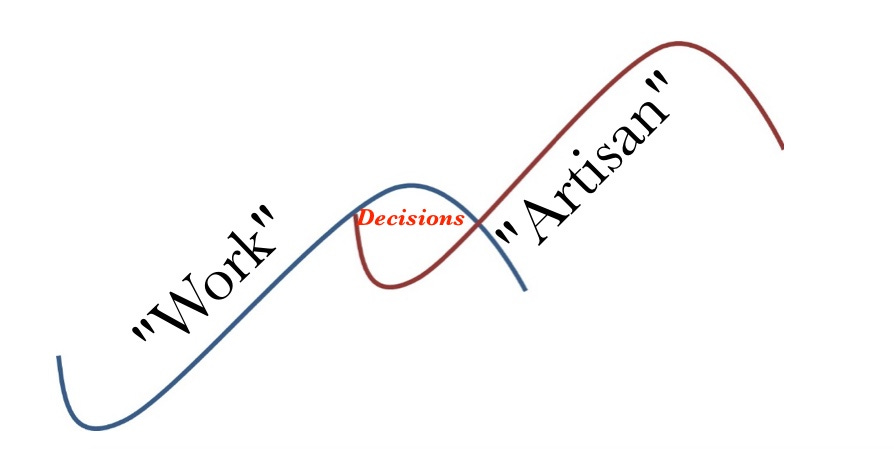The Artisan Lifecycle
Loosening the grip of employment
“Work” has become so ubiquitous in our lives that it is easy to accept it. Companies and Politicians talk about new ventures in terms of “jobs created” without mentioning the quality of the jobs, the generative learning that will be involved, or the societal and environmental impact. We have been reduced to a polarity of returns for investors, jobs for people, and impact as something too minor to mention. Work as religion and dogma, not to be questioned, just to be followed. Question it, though, we must, particularly as significant parts of the congregation may soon be technologies or those heavily within its span of control.
There are three main “rights of passage” when it comes to work - our entry into the workplace, our maturation in it, and our leaving of it. It is easy to forget when we are busy being efficient and performing, but those rights of passage are important, and we should probably pay more attention to them.
For most people, earning a living is both an aspiration and a necessity unless we have family or other resources that make it an option. It means we enter the workplace, working for an organisation, at a level determined by qualifications and connections. The scope for the artisan in us is limited, overshadowed by a necessity to “fit in” and perform. The novelty, both of experience and income, is welcome, and we mostly engage with the confidence of youth. The artisan can wait.
Twenty to thirty years on, our career has matured, and those early dreams of power, prestige and acclimation have encountered a different reality. We have a more accurate understanding of the likely arc of our career, and if we’re lucky, a stable income, some capital, and debt that is more manageable than that in the early years of housing, maybe marriage and family. This is when the artisan reminds us she or he is still there, as the future trajectory of our arc becomes clearer. We used to call it a mid-life crisis, but I prefer William Bions’ view; that we enter the workplace with a “provisional personality” that we use to fit into the system but which is gradually and inexorably replaced by our genuine, authentic self who is less tolerant of the bullshit of much corporate work, and who demands something altogether more satisfying and nurturing. Our conversation with our artisan at this point is a pivotal right of passage, which I’ll return to.
The third rite of passage arrives when we no longer fit the “employment” model through age, skill level, relative infirmity or cost. This used to be fairly predictable, but changing technology, global labour and corporate infirmity make it less so and an increasing possibility from our second rite of passage decision onwards.
I think, increasingly, it needs a strategy. Becoming an artisan is first a mindset, then a set of skills, and then a practice. It means that from the earliest part of our career, we need to nurture the artisan in us, ready for when we need it.
The reality for most of us is that the first part of our careers will be as an employee. We need to accept it with good grace, but not drink the HR Koolaid, and remember it is a transaction. When we hit the second rite of passage, we have serious decisions to make; whether to stay on board the corporate bus, or get off. In order to have a choice, we need to have prepared. I think this is where the biggest challenge lies. We cannot prepare either mindset, skillset, or network if we remain working at maximum capacity and filling what time we do have spare by consuming. We have to be ready and make a choice viable.
The third rite is equally but differently important. We are likely to run out of corporate road whilst still in good health with skills and experience to match. What do we do with them? We can, if we’ve done well, take them on cruises and play golf, but that seems a limited menu for perhaps another two decades.
There is, I suggest, something of a strategy here. Preparation in the first phase, evolution in the second, and eldership in the third.
Tomorrow’s post will be a longer form journal, in which I’ll summarise this month’s thoughts, add them to last month’s, and suggest ideas for a way forward.
I think there’s something to be done here. I’ll send a link for a Zoom session on the first Wednesday of July in a separate post so that those who are interested can have a conversation about it.



Triggers thoughts of eustress - a sufficiency of stress. Pursuit of growth leads us to market consumption as anaesthesia and, as you suggest, voluntary lobotomy. We demonise sources of stress rather than harness them. Back in the day, when I was in the RAF, there were regular "tacevals" - tactical evaluations - which involved somebody turning up and saying something like "I'm a Russian, what you going to do about it sunshine?" All very stressful, but great practice. I sometimes think that we're not too stressed, we just haven't learned how to have a relationship with it.
You make an interesting point about time in the “understorey” I had immediate associations with force fed chickens and our need to accelerate life which perhaps is a product of impatience or perhaps a loss of the ability to think beyond the here and now. This leads me to a contemplation of the absence and/or attempts to eradicate frustration from society which, if you believe Bion, is central to the development of our capacity for thought. Have we in our desire for convenience, lobotomised ourselves?